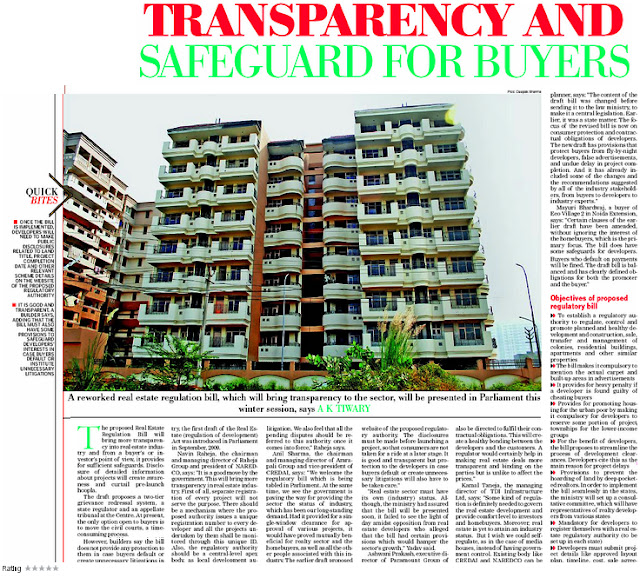New Real Estate Bill For Transparency & Safeguard Of Buyers
The proposed Real Estate Regulation Bill will bring more transparency into real estate industry and from a buyer's or investor's point of view, it provides for sufficient safeguards. Disclosure of detailed information about projects will create awareness and curtail pre-launch hoopla.
The draft proposes a two-tier grievance red-ressal system, a state regulator and an appellate tribunal at the Centre. At present, the only option open to buyers is to move the civil courts, a time consuming process.
However, builders say the bill does not provide any protection to them in case buyers default or create unnecessary litigations in a court of law. So, the central-level regulatory authority should have an arbitrator's power and a stakeholder should first approach this authority before going for any litigation against anyone, real estate developers and builders say.
The bill is set to be brought before Parliament in the forthcoming winter session. The draft is almost final now. After it is fine tuned it will be sent for Cabinet approval. Supposed to set the tone for housing reforms in the country, the first draft of the Real Estate (regulation of development) Act was introduced in Parliament in September, 2009.
Navin Raheja, the chairman and managing director of Raheja Group and president of NAREDCO, says: "It is a good move by the government. This will bring more transparency in real estate industry. First of all, separate registration of every project will not serve the purpose. There should be a mechanism where the proposed authority issues a unique registration number to every developer and all the projects undertaken by them shall be monitored through this unique ID. Also, the regulatory authority should be a central-level apex body, as local development authorities are already monitoring projects and several provisions of this act are a repetition of present rules and regulations of local development authority".
"Secondly, the draft bill has not provided any safety or protection to the developers in case buyers default or create unnecessary litigations. We suggest that the central-level regulatory authority should have the powers of an arbitrator and any stakeholder should first approach this authority before looking at the option of litigation. We also feel that all the pending disputes should be referred to this authority once it comes into force," Raheja says.
Anil Sharma, the chairman and managing director of Amrapali Group and vice-president of CREDAI, says: "We welcome the regulatory bill which is being tabled in Parliament. At the same time, we see the government is paving the way for providing the sector the status of industry, which has been our long-standing demand. Had it provided for a single-window clearance for approval of various projects, it would have proved mutually beneficial for realty sector and the homebuyers, as well as all the other people associated with this industry. The earlier draft proposed to hold developers responsible for project delays and had prescribed stringent penalties in such cases. However, we have already demanded bringing two vital stakeholders - government bodies and financial institutions - into the ambit of the bill."
Rakesh Yadav, the managing director of Antriksh Group, says: "Once the bill is implemented, developers will need to make public disclosures related to land title, project completion date and other relevant scheme details on the website of the proposed regulatory authority. The disclosures must be made before launching a project, so that consumers are not taken for a ride at a later stage. It is good and transparent but protection to the developers in case buyers default or create unnecessary litigations will also have to be taken care."
"Real estate sector must have its own (industry) status. Although, the ministry had assured that the bill will be presented soon, it failed to see the light of day amidst opposition from real estate developers who alleged that the bill had certain provisions which would hamper the sector's growth," Yadav said.
Ashwani Prakash, executive director of Paramount Group of Companies, says: "Undoubtedly, there should be a regulator for real estate. The regulator will create a healthy atmosphere in the industry making the real estate sector more transparent and effective, which would benefit both the builders and the customers. A regulator, be it by the government or from the industry itself, should be welcomed but it should be a balanced document directed towards making the industry more efficient on one hand and at the same time the customers should also be directed to fulfil their contractual obligations. This will create a healthy bonding between the developers and the customers. A regulator would certainly help in making real estate deals more transparent and binding on the parties but is unlike to affect the prices."
Kamal Taneja, the managing director of TDI Infrastructure Ltd, says: "Some kind of regulation is definitely needed to govern the real estate development and provide comfort level to investors and homebuyers. Moreover, real estate is yet to attain an industry status. But I wish we could self regulate, as in the case of media houses, instead of having government control. Existing body like CREDAI and NAREDCO can be empowered to play the role of watchdogs. In CREDAI, we can have a cell of vigilance, to which the affected people or parties may approach with their problems."
"My main concern is these regulatory bodies may further delay development and delivery of projects on time, as in the case of existing system of multiple authorities. As a matter of fact, the transparent mechanism is needed both in government and developers," Taneja says.
Ram Gopal Gupta, a city policy planner, says: "The content of the draft bill was changed before sending it to the law ministry, to make it a central legislation. Earlier, it was a state matter. The focus of the revised bill is now on consumer protection and contractual obligations of developers. The new draft has provisions that protect buyers from fly-by-night developers, false advertisements, and undue delay in project completion. And it has already included some of the changes and the recommendations suggested by all of the industry stakeholders, from buyers to developers to industry experts."
Mayuri Bhardwaj, a buyer of Eco Village 2 in Noida Extension, says: "Certain clauses of the earlier draft have been amended, without ignoring the interest of the homebuyers, which is the primary focus. The bill does have some safeguards for developers. Buyers who default on payments will be fined. The draft bill is balanced and has clearly defined obligations for both the promoter and the buyer."
Objectives Of Proposed Regulatory Bill
To establish a regulatory authority to regulate, control and promote planned and healthy development and construction, sale, transfer and management of colonies, residential buildings, apartments and other similar properties.
The bill makes it compulsory to mention the actual carpet and built-up areas in advertisements. It provides for heavy penalty if a developer is found guilty of cheating buyers, Provides for promoting housing for the urban poor by making it compulsory for developers to reserve some portion of project townships for the lower-income groups. For the benefit of developers, the bill proposes to streamline the process of development clearances. Developers cite this as the main reason for project delays Provisions to prevent the hoarding of land by deep-pocketed realtors. In order to implement the bill seamlessly in the states, the ministry will set up a consultative committee, which will have representatives of realty developers from various states.
Mandatory for developers to register themselves with a real estate regulatory authority (to be set up in each state), Developers must submit project details like approved layout plan, timeline, cost, sale agreement to the regulator before launching projects, A developer will have to create an escrow fund, where a percentage of the money collected from the buyer will be parked, to be used for the specified project; this will ensure that the booking amount is not diverted. The draft comes with stiff penalties to errant developers: 10% penalty of the project cost or jail for a maximum of three years. In extreme cases, a developer could even lose his license.
QUICK BITES
ONCE THE BILL IS IMPLEMENTED, DEVELOPERS WILL NEED TO MAKE PUBLIC DISCLOSURES RELATED TO LAND TITLE, PROJECT COMPLETION DATE AND OTHER RELEVANT SCHEME DETAILS ON THE WEBSITE OF THE PROPOSED REGULATORY AUTHORITY
IT IS GOOD AND TRANSPARENT, A BUILDER SAYS, ADDING THAT THE BILL MUST ALSO HAVE SOME PROVISIONS TO SAFEGUARD DEVELOPERS’ INTERESTS IN CASE BUYERS DEFAULT OR INSTITUTE UNNECESSARY LITIGATIONS




Comments
Post a Comment